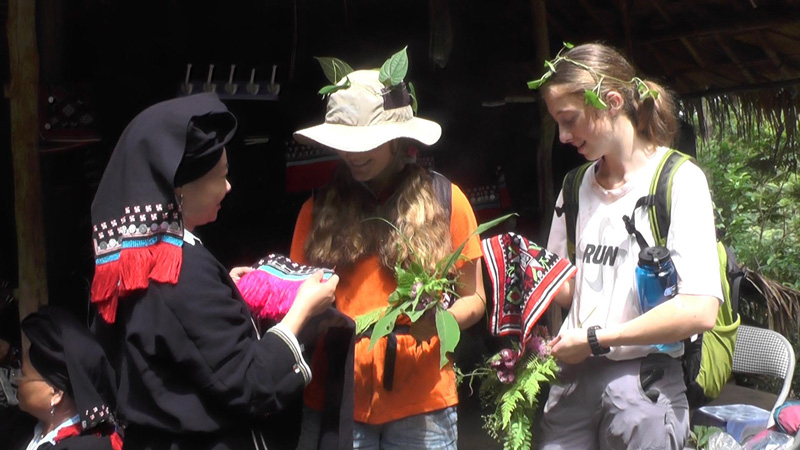
(HBO) - Da Bac district in the northwestern province of Hoa Binh has created a facelift in infrastructure over the recent years, helping boost production and increase local incomes. Particularly, with the high determination of the district’s Party Committee and People’s Committee, Da Bac has achieved positive outcomes in rural building and tourism development.
Tourists visit Sung hamlet, Cao Son commune.
With
the support of local authorities, villagers have changed their mindset to make
investment in tourism development, especially tapping cultural values to
develop community-based tourism. Ke, Sung, and Da Bia hamlets have made their
way to the local tourism map, luring both domestic and international tourists.
Da Bia hamlet is one of the three community-based tourism sites nationwide to
receive the ASEAN community tourism award in 2019.
Besides, the district is also tapping fishery
development potential by building a production cooperation chain and market
connection. Many businesses have invested in building brands for Da River’s
fish, contributing to poverty reduction in the area.
The mountainous district is also leading in
applying information and management technology. Previously, it took several
days to reach Da Bac’s hamlets as they were accessible only by foot, but now it
is just a few hours by cars. The production mindset of local farmers has also
changed. Many have learned to use and manage banks’ capital to develop animal
husbandry, grow forestry, and fruits.
In the five-year implementation of the
resolution adopted at the district’s 24th Party Congress, Da Bac district
reached and surpassed 23 out of the 24 criteria. The district focused on
addressing natural disasters’ consequences and soon stabilised the life of
locals victimised by flash floods and landslides.
In the coming years, local authorities
will push ahead with reforms and increase capacity, responsibility of officials
and Party members, as well as creating social consensus to help the district
get out of poverty and achieve sustainable development./.
Hoa Binh province is undergoing a dynamic transformation amid Vietnam’s national digital transition. Building on Poliburo’s Resolution No. 57-NQ/TW on breakthroughs in science, technology, innovation, and national digital transformation, the province has rolled out a wide range of practical action plans. A standout initiative is the "Digital Literacy for All” movement, an effort to ensure that no one is left behind in the digital era.
Hoa Binh province is undergoing a dynamic transformation in the wake of the national digital transformation movement. Building on Resolution No. 57-NQ/TW of the Politburo on breakthroughs in science, technology, innovation, and national digital transformation, the province has implemented a wide range of practical action plans. A standout initiative is the "Digital Literacy for All” movement ambitious effort to ensure that no one is left behind in the digital age.
With a spirit of unity and proactive problem-solving, the Party Committee, the government and the people of Dong Lai Commune (Tan Lac District) have made great strides in implementing the resolutions of the 24th Party Congress of the commune for the 2020 - 2025 term. Focusing on leadership and practical actions, the commune has brought the Party’s resolutions into daily life, creating strong impacts and pushing the local development forward.
Amid the nationwide push for digital transformation, young people in Hoa Binh Province are stepping up as dynamic pioneers, applying technology to enhance Youth Union operations and expand the reach of youth-led initiatives. Through creativity and adaptability, Youth Union organizations at all levels have introduced a series of practical solutions, contributing to modern governance and community development.
In recent years, An Nghia commune, located in Lac Son district, has stepped up administrative reform, focusing on improving the quality and efficiency of its single-window service unit for receiving and processing administrative procedures. These improvements have helped create favourable conditions for local residents and organisations to handle administrative procedures, contributing to the commune’s broader socio-economic development.
The Prime Minister-approved master plan to develop the multi-use value of forests ecosystems through 2030, with a vision to 2050, aims to improve the management and sustainable use of forest resources, create jobs, increase incomes, and improve the living standards of ethnic minorities, people in mountainous and remote areas, forest workers and those living near forests.



